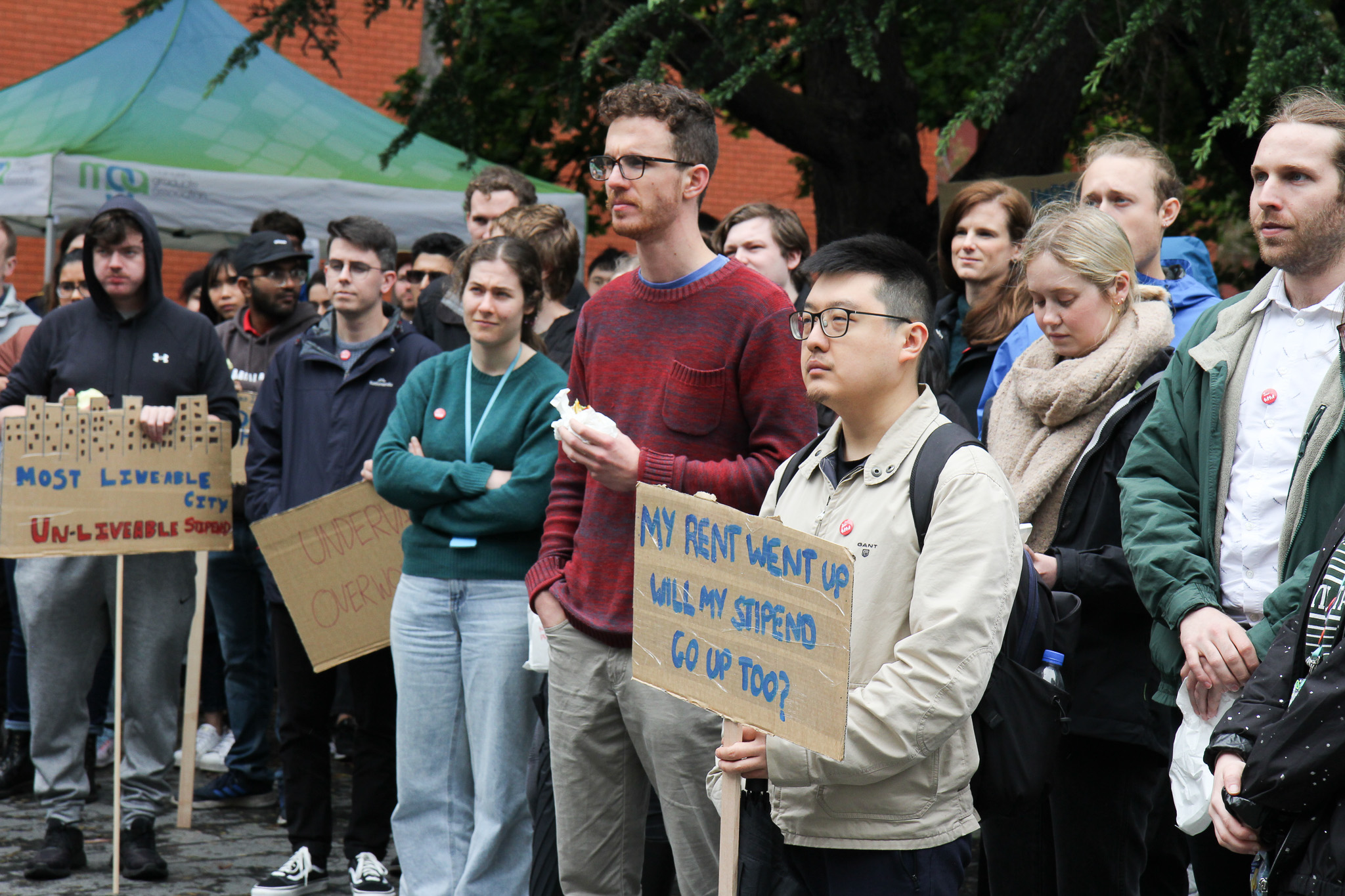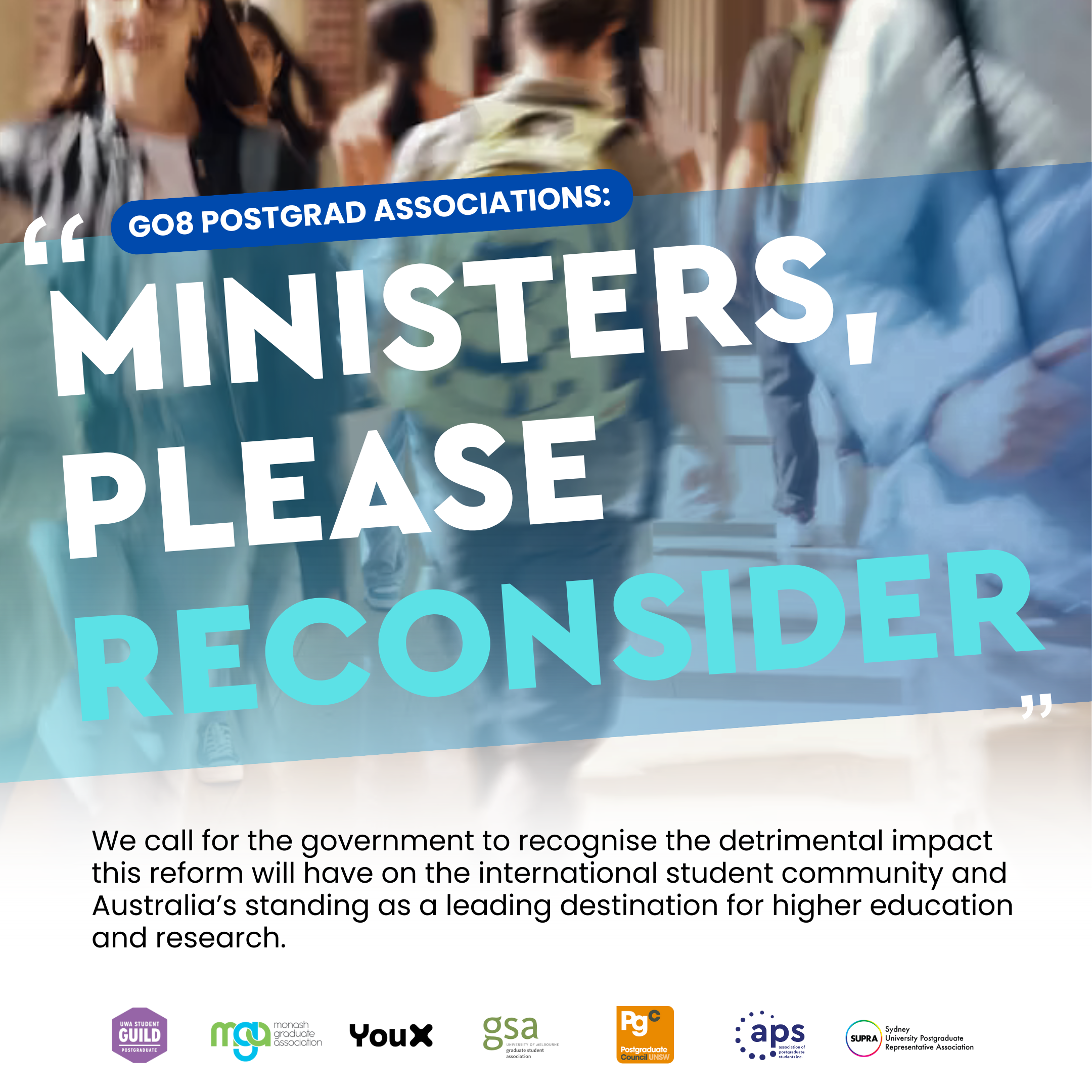RAISING ISSUES ABOUT ACADEMIC MISCONDUCT DELAYS
August 2025
In recent semesters, many graduate students have seen significant delays of up to several months across the academic misconduct process. These significant delays means unit results remain unfinalised, which can cause serious impacts to a student's course progression and enrolment.
Some students' graduations are being impacted, or having to incur serious costs having to extend their studies and visas for an extra semester.
The MGA has made a submission to senior University management with recommendations for the University to address these issues. The University has acknowledged the delays and are implementing strategies to mitigate the impact. Any students affected by such delays are recommended to reach out to MGA Advocacy and to their student representatives.
Read MGA's Submission here.
PROVIDING FEEDBACK ON THE ACADEMIC PROGRESS PROCESS
Semester 1, 2025
Each semester, students who fail a certain number of units or certain course requirements are required to go through the academic progress review process. In many cases, students can face exclusion from their course for failing to pass their units or course requirements.
Oftentimes, students failing their units are facing serious personal issues which means they require extra flexibility and support. MGA Advocates are heavily involved in this process, supporting students through responding to the University and at hearings.
This semester, the MGA Advocacy team has provided feedback and suggestions to the University on an assortment of issues, and ways the process can be improved to be more accessible to students, and to ensure more equitable outcomes are reached.
Read the submission here.
LOBBYING EFFORTS TO INCREASE HDR STIPENDS
Update as of 29 April, 2025

The MGA is working to advocate for an increase to the RTP stipend rate in line with the minimum wage under a framework similar to the lobbying efforts of 2024.
Our HDR students have made a submission to the University to resume efforts relying on key findings from recent surveys on graduate student satisfaction.
You can read the full proposal here.
So while you may not see the big public rallies and witty placards of previous campaigns, know that we are lobbying (not so quietly) away in the background, raising awareness of graduate student poverty in every University meeting we attend, presenting the evidence from our research to every Faculty ADGR, and reminding senior managers of the links between poverty, mental health and completion rates.
INTERNATIONAL STUDENT CAPS
The Australian Government plans to introduce a new enrolment cap for international students starting in 2025. The proposal aims to limit the total number of international students to 270,000, ensuring a more balanced distribution across the country and safeguarding the quality of education by reducing the sector's reliance on international student fees.
The MGA supports the government's commitment to strengthening the quality and integrity of Australia's international education sector. We agree that strong measures are essential to protect the reputation of Australian education and ensure students receive a high standard of learning.
However, while we commend the intent behind the Education Services for Overseas Students Amendment (Quality and Integrity) Bill 2024, we believe certain provisions in its current form could have unintended consequences that may ultimately undermine these objectives.
Primarily, the MGA is concerned about:
- The proposed ministerial powers to impose enrolment caps on universities and the consequences of this on universities' autonomy, financial, and operational stability.
- The proposed timeframe for the implementation of the provisions under the Bill.
- The negative discourse surrounding international students in recent public commentary and policy discussions, particularly regarding their supposed impact on housing markets.
As such, the MGA has prepared a Submission to Senate Inquiry into the Education Services for Overseas Students Amendment (Quality and Integrity) Bill 2024 (September 2024).
 CHANGES TO STUDENT VISA POLICIES
CHANGES TO STUDENT VISA POLICIES
The Monash Graduate Association (MGA) recognises that a significant proportion of international students will be affected by the changes the Australian Government is proposing to its migration and visa system (refer to page 68). Many of the reforms presented in the migration strategy are designed to bolster the economy, address the skills shortage & reduce migrant worker exploitation.
Despite this, certain commitments outlined in the migration strategy will negatively impact international students. Proposed & ongoing changes include increasing the English language requirement for Student & Temporary Graduate Visa (TGV), reducing the maximum eligible age for the TGV from 50 to 35 years and shortening the duration of work rights granted by the TGV.
In response to this, postgraduate student associations & representatives across Australia are mobilising to combat these changes. The MGA is actively contributing to the efforts through the following measures:
- The formation of a working group to analyse how the recommendations in the migration strategy impacts international students and the existing evidence to support our lobbying.
- Collective lobbying with the Go8 postgraduate associations to government officials against certain recommendations.
- Representation at University committees and collaboration with Monash management.
MAY 2024 - Response letter from Clare O'Neil MP, Minister for Home Affairs
MAY 2024 - Letter to Monash Vice-Chancellor, Professor Sharon Pickering
MARCH 2024 - MGA Report: Reviewing the Detrimental Impact to Australia's Future of the Federal Government's Migration Strategy
FEBRUARY 2024 - Letter to Clare O’Neil MP, Minister for Home Affairs
FEBRUARY 2024 - Letter to Andrew Giles MP, Minister for Immigration, Citizenship and Multicultural Affairs
! Update as of 28 May, 2024 !
On Monday, 27 May 2024, the Federal Government updated its website announcing new exemptions for research degree graduates from the proposed new age limit. Their statement reads:
The maximum eligible age for Post-Higher Education Work stream applicants will reduce to 35 years of age or under at the time of application. Masters (research) and doctoral degree (PhD) graduates and Hong Kong and British National Overseas passport holders will still be eligible if they are under 50 years of age.
The MGA welcomes these changes and would like to acknowledge and thank all of our students and representatives who took the time to share their stories, contribute to internal efforts and write to local MPs. The exemption from the age limit for research degree graduates marks a major triumph for currently enrolled graduate research students at Monash.
While this may come as good news to some, we recognise that the battle is not yet over. We have worked collaboratively with Monash University to achieve a case-by-case early release of Semester 1 results for graduate coursework students due to complete their degrees next month.
The MGA will continue to lobby just as fervently on behalf of our graduate coursework students with a view to achieving a similar outcome for this cohort.
Want to know more about past campaigns and lobbying efforts by the MGA? Click here.